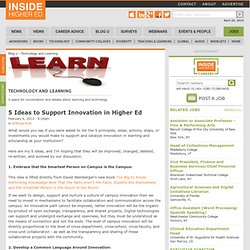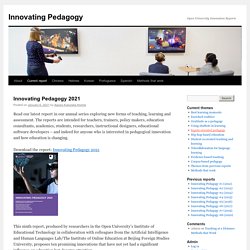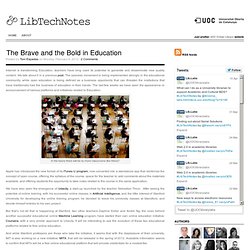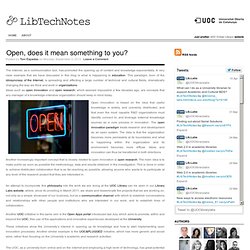

5 Ideas to Support Innovation in Higher Ed. What would you say if you were asked to list the 5 principles, ideas, actions, steps, or investments you would make to support and catalyze innovation in learning and scholarship at your institution?

Here are my 5 ideas, and I'm hoping that they will be improved, changed, deleted, re-written, and evolved by our discussion. 1. Embrace that the Smartest Person on Campus is the Campus: This idea is lifted directly from David Weinberger's new book Too Big to Know: Rethinking Knowledge Now That the Facts Aren't the Facts, Experts Are Everywhere, and the Smartest Person in the Room Is the Room. If we want to design, support and nurture a culture of campus innovation then we need to invest in mechanisms to facilitate collaboration and communication across the campus. 2. My first instinct when getting any group of 2 or more people together is to give everyone a book to read and discuss. The problem with innovation is that we all think that we are innovative. 3. 4. 5. E-Learning and Digital Cultures #EDCMOOC.
MOOC. Project. Library 2.0. Open University Innovations Report #1. This series of help sheets is designed for people who are trying out distance and online education for the first time, and for teachers who have already taught at a distance and want to try something new.

Each help sheet outlines one approach to learning at a distance and provides guidance on how to put this into practice. All the help sheets are based on approaches covered in past Innovating Pedagogy reports and take into account that students may have only limited access to technology and the Internet. The latest report in our annual series explores new forms of teaching, learning and assessment for an interactive world, to guide teachers and policy makers in productive innovation.
Download Innovating Pedagogy 2020 This eighth report, produced in collaboration with the National Institute for Digital Learning (NIDL), Dublin City University, Ireland, proposes ten innovations that are already in currency but have not yet had a profound influence on education in their current form. The Brave and the Bold in Education. Posted by Toni Espadas on Monday, February 6, 2012 · 2 Comments Internet is transforming Education, teachers have long used its potential to generate and disseminate new quality content.

We talk about it in a previous post. The openess movement is being implemented strongly in the educational community, while open education is being defined as a business opportunity that can threaten the institutions that have traditionally had the business of education in their hands. The last few weeks we have seen the appearance or announcement of various platforms and initiatives related to Education. In the future there will be no more classrooms like these? Apple has introduced the new format of its iTunes U program, now converted into a standalone app that reinforces the concept of open course, offering the syllabus of the course, space for the teacher to add comments about the materials available, and offering students the opportunity to take notes related to the course in the same application.
Open, does it mean something to you? Posted by Toni Espadas on Monday, September 3, 2012 · Leave a Comment The Internet, as a communication tool, has promoted the opening up of content and knowledge exponentially.

A very clear example that we have discussed in this blog is what is happening to education. This paradigm, born of the idiosyncrasy of the Internet, is spreading and affecting a large number of technical and cultural fields, dramatically changing the way we think and work in organizations. Ideas such as open innovation and open research, which seemed impossible a few decades ago, are concepts that any manager of a knowledge-intensive organization should keep in mind today. Open innovation is based on the idea that useful knowledge is widely, and unevenly, distributed, and that even the most capable R&D organizations must identify, connect to, and leverage external knowledge sources as a core process in innovation.
Another increasingly important concept that is closely related to open innovation is open research.